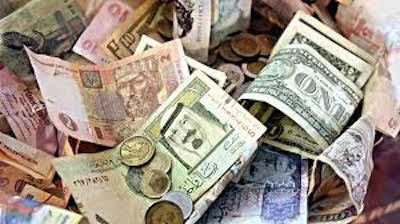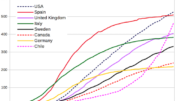New York City, the proclaimed “city that never sleeps,” is quieter than ever before. In a dystopic change to New York residents’ lives, publicly standing within six feet of another person is a criminal act, as is socially gathering for a nonessential reason, according to the Wall Street Journal.
These new regulations, issued by New York Governor Andrew Cuomo, have implications that go beyond New York’s social scene. Businesses central to the service sector of the economy have been ordered to shut down. Nail technicians, hair stylists, and many retail workers have found themselves jobless, along with the majority of the entertainment industry as clubs and theatres lock their doors.
Normally one of the strongest economies in the world, New York City functions as a telling example of the effects of the coronavirus on the American economy. Many US states have begun enforcing similar rules on businesses to discourage unnecessary interactions. These regulations, while keeping the public safe, have resulted in large economic ramifications. According to Microsoft News, American unemployment has reached a record high, with six million people filing for unemployment as of this month.
To combat what appears to be an approaching economic recession, both Republicans and Democrats have worked to negotiate stimulus checks for Americans. Stimulus checks are exactly what they sound like – checks designed to stimulate the economy. Forbes reports that the checks begin at 1200 dollars for those filing as single, but increase by 500 dollars for each dependent in the household. This is meant to assure that those who are out of work can pay their bills, rent, and for food during this crisis, sending money back into the economy.
Certain restrictions apply based on income. For example, Americans who filed their taxes as single will not receive a check if their income exceeds 99,000 dollars a year, according to Forbes.
While the amount received is adjusted based on income and child dependents, location of residence is not taken into account. According to Business Insider, the average rent for a family of four in New York is just under 1200 dollars a month, while the average rent in South Dakota is under 700 dollars. Under this stimulus plan, both families would receive payments totalling 3400 dollars, with 1200 dollars per adult and 500 dollars per dependent. Unfortunately, this means that those in states with expensive rent will have less to live on, and may consequently struggle to feed their families and pay for utilities.
“It really is unfair that families in different locations are getting the same amount because the same amount of money has different values in different locations,” Tanisha Panda (’23) said.
Another perceivable flaw in the stimulus plan is that the payments are one-time checks. Rent, utilities, and groceries are not one-time expenses, but they are necessary. CNBC reports that the majority of Americans could not live off of these checks for more than three months, a statistic backed up by the aforementioned cost of rent for a New York family.
“People should receive stimulus checks once a month so they can pay for basic utilities rather than receiving it once and then struggling to cover the cost of utilities without that income in future months,” Jove Luna (’22) said.
Not even the brightest epidemiologists can be sure of how long Americans will be in quarantine, with the coronavirus death toll rising every day. It only makes sense for the government to adopt a more sustainable approach to supporting the working class during this time, rather than scrambling to organize another stimulus package if quarantine exceeds two months.





